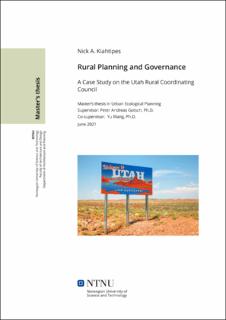| dc.description.abstract | In the urban State of Utah, rural communities face a myriad of economic, social, and environmental challenges. After the multifunctional transition and localism movements of the 1960s, 70’s, and 80’s left rural communities lacking the professional and resource capacities of their urban counterparts, these communities faced decades of disinvestment. As part of a growing interest in rural Utah, December of 2018 saw the creation of the Rural Coordinating Council (RCC), a grassroots initiative among service providers that seek to better allocate time, resources, and strategies in rural Utah. This study aims to understand how the RCC affects rural planning and rural governance in Utah, and to critically analyze the RCC to determine its prospects and transferability.
To research this aim, the research strategy used an explorative case study approach. Data collection methods included documents, interviews, and focus groups. Documents ranging from meeting notes, briefs, and action plans were examined. 16 in-depth and focused interviews were carried out with members of the RCC and external practitioners. Three synchronous focus groups were held with RCC members. Data analysis methods included thematic analysis, analytic generalization, and SWOT analysis. By using a qualitative research and content analysis software, the analysis was systematic and reliable. The results detailed the RCC structure, highlighted its prospects and transferability, and showed that the RCC impacts both rural planning and rural governance in Utah.
The RCC is a unique type of intergovernmental partnership that promises results for those in rural Utah. The research provided a thorough, explorative view of the RCC, resulting in several implications not only to the RCC but to external practitioners and to planning and governance theory. On the basis of the results, those internal and external to the RCC have better and more accessible data to act and make decisions on. Others are able to learn from the RCC model to implement and improve the practices of rural planning and rural governance. | |
